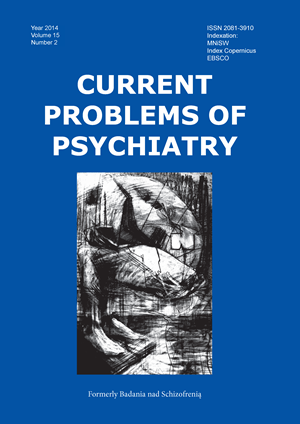Znaczenie układu immunologicznego w patogenezie zaburzeń afektywnych
Słowa kluczowe:
zaburzenia afektywne, układ immunologiczny, cytokinyAbstrakt
Zaburzenia afektywne są ściśle powiązane z brakiem kompatybilności układu immunologicznego z powodu wzmożonego wydzielania cytokin prozapalnych. Podwyższone poziomy interleukiny-1, interleukiny-6 i czynnika martwicy guza alfa, pełnią ważną rolę w patogenezie zaburzeń psychicznych takich jak depresja i zaburzenie afektywne dwubiegunowe. Obecnie, molekularny wpływ tych substancji na komórki pozostaje słabo poznany. Jest to częściowo spowodowane różnicami w obrazie klinicznym tych zaburzeń oraz złożonymi interakcjami pomiędzy genetyką a cytologią.
Niektóre badania ukazują że nieprawidłowości układu immunologicznego w zaburzeniach psychicznych są zlokalizowane zarówno na obwodzie jak i w obrębie tkanki mózgowej. Aktywacja niektórych komórek układu immunologicznego jest ściśle powiązana z nadekspresją czynników zapalnych, które mogą stanowić kluczowe znaczenie w dysfunkcji mózgu.
Bibliografia
1. McKernan DP, Dennison U, Gaszner G, Cryan JF, Dinan TG. Enhanced peripheral toll-like receptor responses in psychosis: further evidence of a pro-inflammatory phenotype. Transl Psychiatry 2011 1, e36.
2. O’Neill LA. How Toll-like receptors signal: what we know and what we don’t know. Curr Opin Immunol 2006;18:3-9.
3. Okun E, Griffioen K, Barak B, Roberts NJ, Castro K, Pita MA, et al. Toll-like receptor 3 inhibits memory retention and constrains adult hippocampal neurogenesis. Proc Natl Acad Sci U S A 2010;107:15625-30.
4. Okun E, Griffioen KJ, Lathia JD, Tang SC, Mattson MP, Arumugam TV. Toll-like receptors in neurodegeneration. Brain Res Rev 2009;59:278-92.
5. Okun E, Griffioen KJ, Mattson MP. Toll-like receptor signaling in neural plasticity and disease. Trends Neurosci 2011; 34:269-81.
6. Ghanshyam N. Pandey, Hooriyah S. Rizavi, Xinguo Ren, Runa Bhaumik, Yogesh Dwivedi. Toll-like receptors in the depressed and suicide brain. Journal of Psychiatric Research 53, 2014; 62-68.
7. Barbosa IG, Nogueira CR, Rocha NP, Queiroz AL, Vago JP, Tavares LP, Assis F, Fagundes CT, Huguet RB, Bauer ME, Teixeira AL, de Sousa LP. Altered intracellular signaling cascades in peripheral blood mononuclear cells from BD patients. Journal of Psychiatric Research 47, 2013 1949-1954.
8. Chao CC, Ma YL, Lee EH. Brain-derived neurotrophic factor enhances Bcl-xL expression through protein kinase casein kinase 2-activated and nuclear factor kappa B-mediated pathway in rat hippocampus. Brain Pathology 2011; 21 (2):150-62.
9. Myint AM, Leonard BE, Steinbusch HW, Kim YK. Th1, Th2, and Th3 cytokine alterations in major depression. J Affect Disord. 2005 Oct;88 (2):167-73.
10. Dvoráková M, Zvolský P, Herzog P. Endogenous psychoses and T and B lymphocytes. Folia Haematol Int Mag Klin Morphol Blutforsch. 1980; 107(2):221-8.
11. Szelényi J. Cytokines and the central nervous system. Brain Res Bull. 2001 Mar 1;54(4):329-38.
12. Smith RS. The macrophage theory of depression. Med Hypotheses. 1991 Aug;35 (4):298-306.
13. Himmerich H., Fulda S, Linseisen J, Seiler H, Wolfram G, Himmerich S, Gedrich K, Kloiber S, Lucae S, Isinq M, Uhr M, Holsboer F, Pollmacher T. Depression, comorbidities and the TNF-alpha system. European Psychiatry 2008;23:421-9.
14. Reichenberg A, Yirmiya R, Schuld A, Kraus T, Haack M, Morag A, Pollmacher T. Cytokine-associated emotional and cognitive disturbances in humans. Archives of General Psychiatry 2001;58:445-52.
15. Wichers M, Maes M. The psychoneuroimmuno-pathophysiology of cytokine-induced depression in humans. The International Journal of Neuropsychopharmacology 2002;5:375-88.
16. Robinson CM, Hale PT, Carlin JM. The role of IFN-gamma and TNF-alpha-responsive regulatory elements in the synergistic induction of indoleamine dioxygenase. Journal of Interferon and Cytokine Research 2005;25:20-30.
17. Zhu CB, Blakely RD, Hewlett WA. The proinflammatory cytokines interleukin-1 beta and tumor necrosis factor-alpha activate serotonin transporters. Neuropsychopharmacology 2006;31:2121-31.
18. Najjar S, Pearlman DM, Alper K, Najjar A, Devinsky O. Neuroinflammation and psychiatric illness. J Neuroinflammation. 2013 Apr 1;10:43. doi: 10.1186/1742-2094-10-43.
19. Heinrich PC, Castell JV, Andus T. Interleukin-6 and the acute phase response. Biochem J 1990 ; 265 : 621-36.
20. R.Kurzrock. Cytokine deregulation in cancer. Biomed Pharmacother 2001; 55:543-7.
21. Bai YM, Su TP, Tsai SJ, Wen-Fei C, Li CT, Pei-Chi T, Mu-Hong C. Comparison of inflammatory cytokine levels among type I/type II and manic/hypomanic/euthymic/depressive states of bipolar disorder. J Affect Disord. 2014 Sep;166:187-92.
22. Ritter PS, Kretschmer K, Pfennig A, Soltmann B.Disturbed sleep in bipolar disorder is related to an elevation of IL-6 in peripheral monocytes. Med Hypotheses. 2013 Dec;81(6):1031-3.
23. Liu Y, Ho RC, Mak A. Interleukin (IL)-6, tumour necrosis factor alpha (TNF-α) and soluble interleukin-2 receptors (sIL-2R) are elevated in patients with major depressive disorder: a meta-analysis and meta-regression. J Affect Disord. 2012 Aug;139(3):230-9.
24. Berk M, Wadee AA, Kuschke RH, O’Neill-Kerr A: Acute phase proteins in major depression. J Psychosom Res1997,43:529-534.
25. Yarlagadda A, Alfson E, Clayton AH. The blood brain barrier and the role of cytokines in neuropsychiatry. Psychiatry (Edgmont) 2009 6 (11), 18–22.
26. Stertz, L., Magalhaes, PV, Kapczinski F. Is bipolar disorder an inflammatory condition? The relevance of microglial activation. Curr. Opin. Psychiatry 2013 26 (1), 19–26.
27. Hirst WD, Price GW, Rattray M, Wilkin GP. Serotonin transporters in adult rat brain astrocytes revealed by [3H]5-HT uptake into glial plasmalemmal vesicles. Neurochem Int 1998 33(1):11–22.
28. Kubota N, Kiuchi Y, Nemoto M, Oyamada H, Ohno M, Funahashi H, Shioda S, Oguchi K. Regulation of serotonin transporter gene expression in human glial cells by growth factors. Eur J Pharmacol 2001 417(1–2):69–76.
29. Malynn S, Campos-Torres A, Moynagh P, Haase J. The pro-inflammatory cytokine TNF-α regulates the activity and expression of the serotonin transporter (SERT) in astrocytes. Neurochem Res. 2013 Apr;38(4):694-704.
30. Olajossy M. : Neuroimmunologia a schizofrenia. IV Lubelskie Spotkania Naukowe, Lublin, 1995, 76-79
31. Olajossy M, Książek A, Kozioł M, Spasiewicz D.: Interleukina 2 oraz interleukina 6 w schizofrenii przewlekłej. V Lubelskie Spotkania Naukowe, Lublin, 1996, 306-309.


